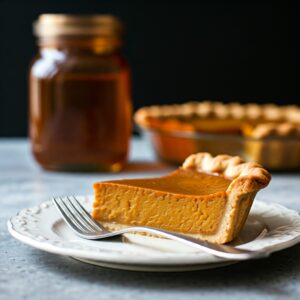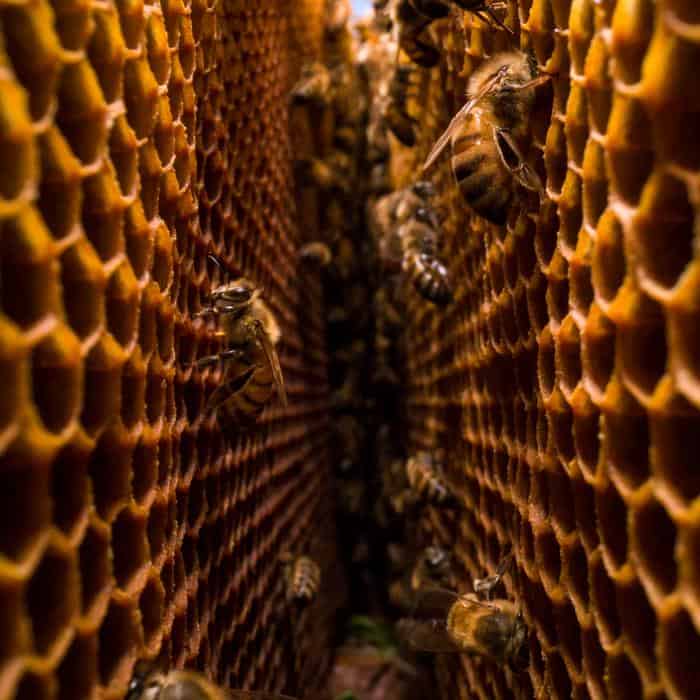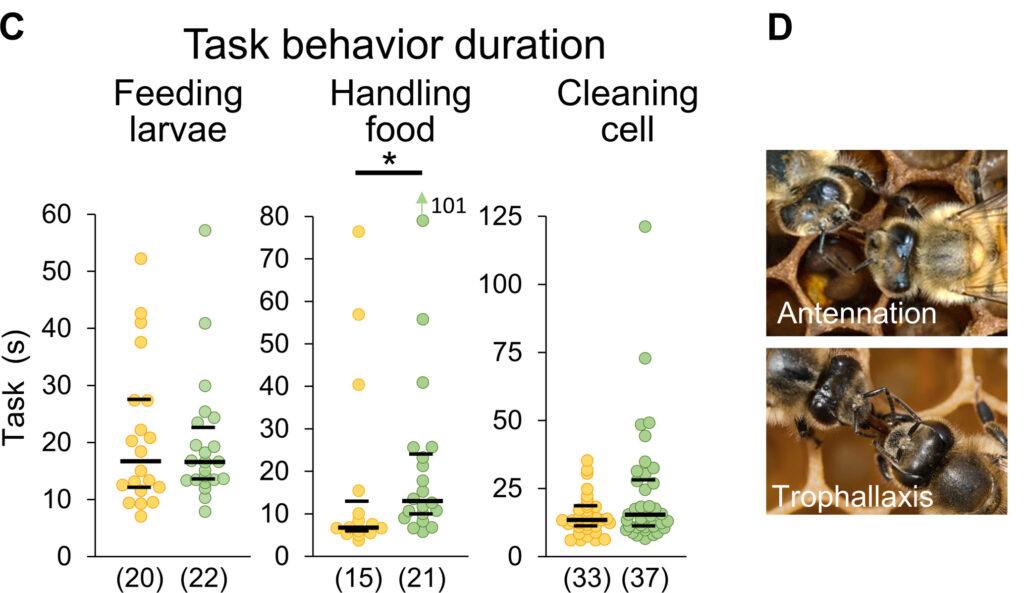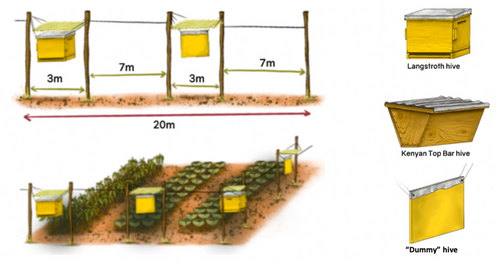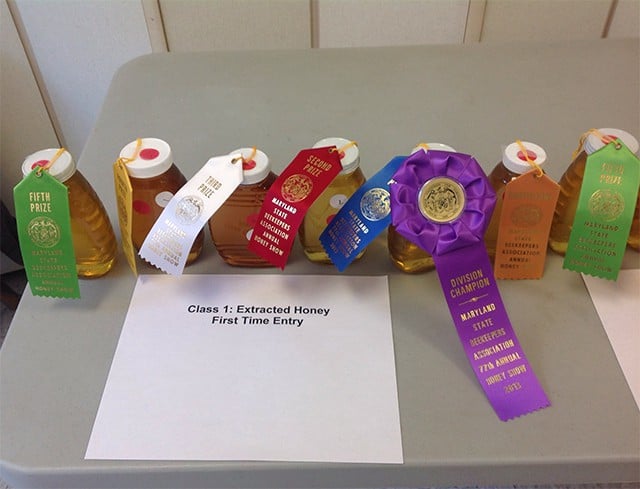
Printable edition
President's Letter
- President’s Message, November 2024
How’s Your Honey, Honey?
Enter the Maryland State Beekeepers Annual Honey and Cooking Show at this weekend’s state meeting and see for yourself! Lots of categories! Lots of prizes!
A fantastic warm up for the big EAS Conference Honey Show in New Jersey in 2025! Let your creativity run wild, and enter some different categories, like Dipped Beeswax Candles, Honey Cookery, and Photography.
Now is your time to shine, and win cash prizes and accolades. The EAS Honey Show next year comes with some pretty shiny silver plates. You know you want to give it a try!
Learn more about the Annual Honey Show
Honey Show Entry FormWatch your USPS mail in December for annual Apiary Registration reminder, including another letter from me about the importance of the Apiary Inspection Fund. Our inspectors are here for us all year 'round, this is our chance to stand up for them.
This Saturday's meeting is also the time for our annual General Membership Meeting, Elections, and Awards! Learn more about this important annual event in the life of our 116 year old association!
Also, remember that after a long hot summer, your MSBA T-shirt might need a replacement! Or maybe it is time for long sleeves! We also have other cool MSBA merchandise available.
[Return to November 2024 BeeLine newsletter]
Notes from the Apiary Inspector
- Notes from the Apiary Inspector, November 2024
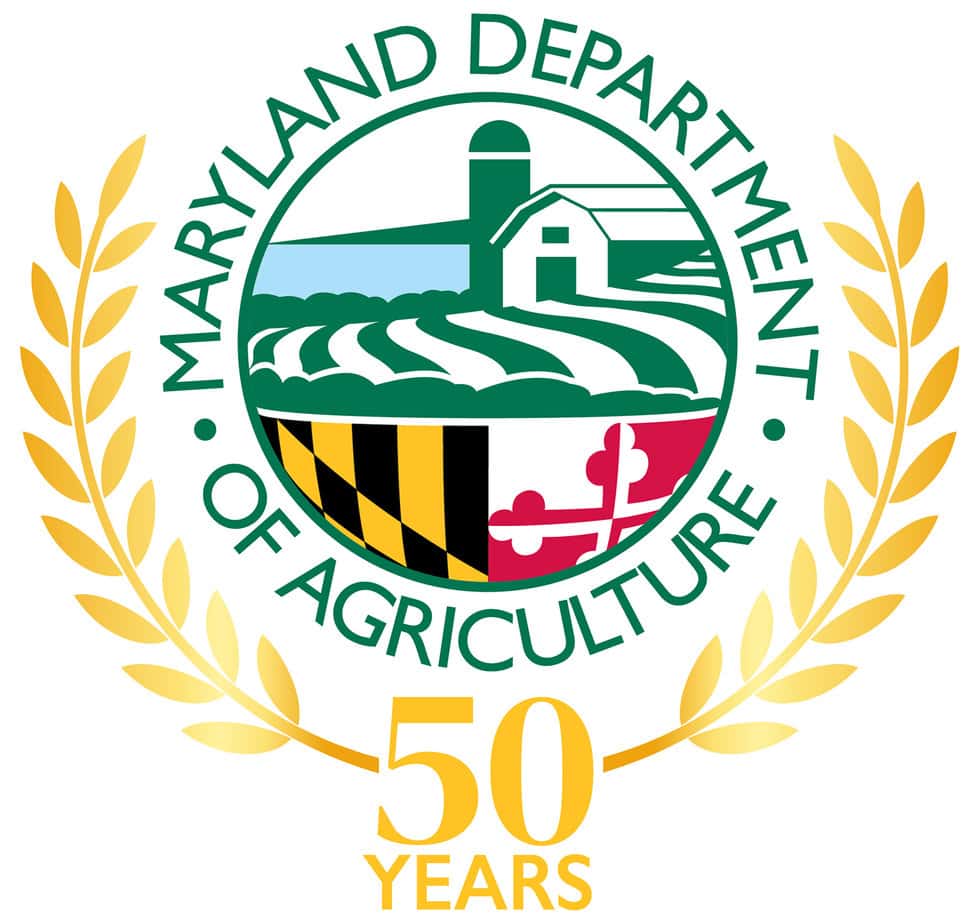
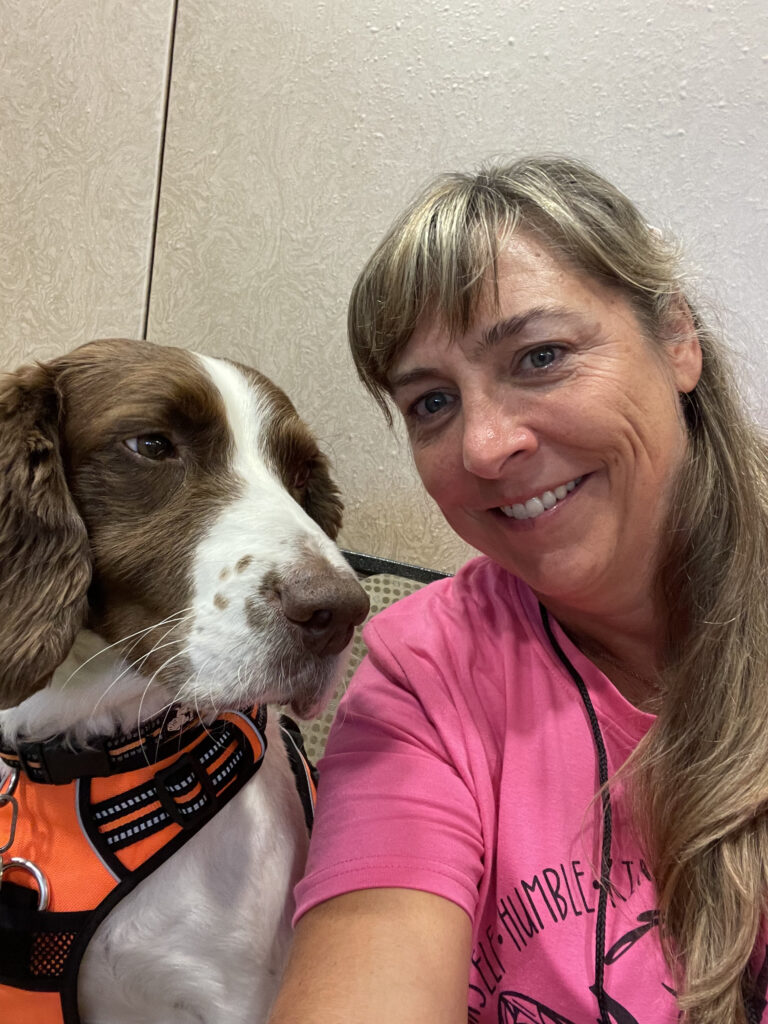
- I recently attended a workshop at Auburn University with the Apiary Inspectors of America. We are receiving education and training and starting a dialogue about regulatory action on the invasive Tropilaelaps mite. Hoping and praying this invasive pest does not make to the U.S.A!
- We are also seeing a resurgence of tracheal mites. Symptoms of tracheal mite infestation are not unique, and can look like Parasitic Mite Syndrome from Varroa infestations. These include K-wings, crawling bees, shortened life span: dying away from the colony. Colonies typically appear normal through fall and die off during winter confinement.
- Spotted Lanternfly (SLF) Adults are in almost every county now. The honey bees will work/forage on the Spotted Lanternfly honeydew. In some areas where SLF is plentiful, the colonies were able to gain winter weight. Some beekeepers choose to extract the fall flow for honey sales.
- If you are moving bees in and out of the state, please acquire a permit through MDA and continue to monitor and look for egg masses on your hives and equipment.
- I am seeing a lot of hungry bees. This drought and lack of nectar flow is causing our colonies to be light on honey stores for winter. Fall feeding has caused problems with robbing and attracting yellow jackets. This fall has been tough with all the above.
- I received a lot of calls about “queenless” hives, BUT dearth and/or Varroa treatments commonly cause queens to quit laying. You can have a Queen present and “broodless” colonies. Feeding to stimulate the queen to lay her winter bees is leading to robbing and vespula pressure.
- We received some calls about possible Northern Giant Hornet sightings. We fielded significantly fewer than in years past. Yellow jackets seem to be the problem this year, not European Hornets.
- Field Watch/Bee Check: This Voluntary beehive mapping tool is going strong. There are more beekeepers registered than any other crop!
- Thank you to all the beekeepers that participated in the USDA/APHIS National Honeybee Survey. We were able to complete all 24-sample sites. AGAIN, thank you to all who were willing to participate. Anyone willing to participate in 2025, please let me know. You must have 8 colonies located in the same apiary to qualify. Did I mention that I appreciate your willingness to participate?!
- If you have or are starting a beekeeping management business, and especially if you are being paid to apply ANY miticides to someone else's colonies, you MUST have a pesticide applicators license. KEY WORDS HERE: If you are being paid, and if you do not own the bees. This does not apply to mentor/mentee relationships. This applies to Apiary management businesses.
- Mailing of the 2024 apiary registration form will be in December. Please update, sign and return your registration forms as soon as possible. There are many ways to return this form! USPS, Scan + email, Fax.
- We caught 1 honey bee swarm at the port of Baltimore, and and swarm at BWI airport: both were eradicated. The swarm traps are monitored and the lure is refreshed bi-weekly. We are looking for any Apis species and their parasites that may have hitched a ride on shipments. (Like Apis cerana or Tropilaelaps)
- EAS was a huge success! Super fun and educational! Kudos to all who participated in putting on a phenomenal conference.
- Final Note: The HUMAN Apiary Inspectors are finished for the season, and the CANINE Disease detectors are getting ready to start back to work (as soon as we get some colder temperatures). We have been training and preparing to get back into the field, and are working on scenting and stamina now. Maryland's AFB dogs will be back into inspections as soon as the weather hits 50 degrees F and below. We will work on commercial beekeepers moving to California first. Mack officially retired on July 1, 2024. He worked 9 winters for the Maryland Department of Agriculture!
Cybil Preston
Chief Apiary Inspector
State Apiarist
EAS Certified Master Beekeeper
Certified Maryland Honey Judge
Maryland Department of Agriculture
50 Harry S. Truman Parkway
Annapolis, Maryland 21401
cybil.preston@maryland.gov
(410) 841-5920(O)
(410) 562-3464 (M)
Website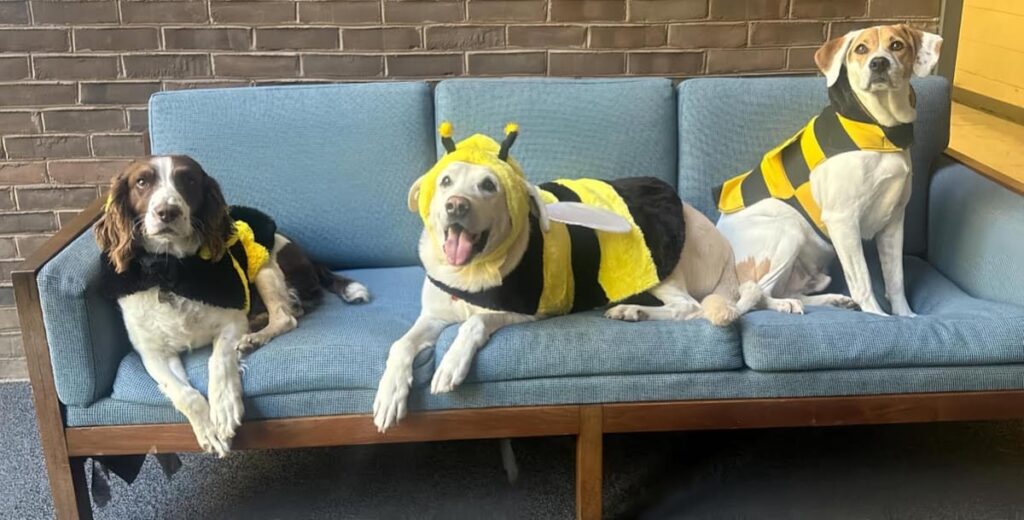
[Return to November 2024 BeeLine newsletter]
Lego-Compatible Beehives
- Lego-compatible Lang Hives and Beekeeping Education!
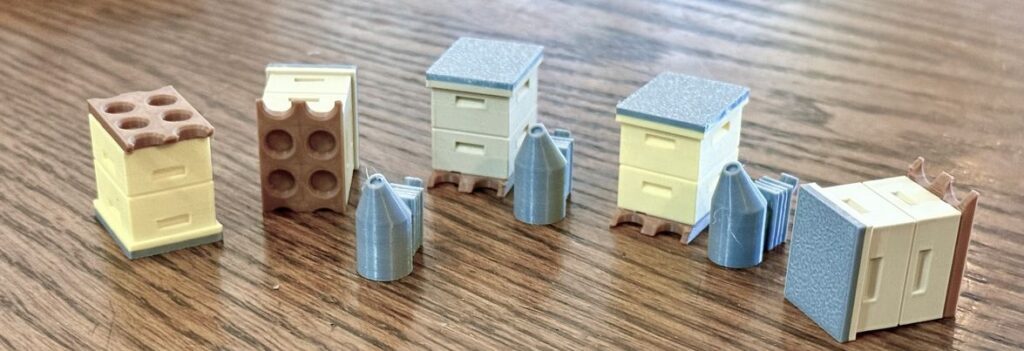
With huge thanks to Matt Gagle of Aperture Apiaries, the kids in my elementary school beekeeping education classes now have a Lego-compatible Langstroth hive (see photo!) to add to their snap-together polyculture farms! Matt is a skilled 3D printer of wonderful educational (and other) items, including some that have been discussed in earlier BeeLine newsletters. Earlier this fall, I talked to him about this activity, and within a few days he had something that beat anything I could find in a Lego store or online! And both I and my students are grateful.
If you want to give them a try, the Lego-compatible (NOT Lego) hives are for sale from Matt on his website at https://apertureapiary.com/products/lego-compatible-langstroth-hive-and-smoker.
When teaching about science, and especially pollination and bees, it really helps kids to be able to look at, handle, and put stuff together (and take it apart, and smoosh it, and break it sometimes, and then look at the pieces with a magnifying glass...) A consistant hero in our beekeeping community, Matt Gagle, has helped me make one of the more complex lessons easier to understand and more rewarding!
Pollination, and by extension, its perpetrators–pollinators–are part of national Next Generation Science Standards for the second grade. For that reason, I have been offering a 10-part beekeeping unit in the science classroom at the school around the corner from me for about ten years. After we take flowers apart, look at dead bees, make candles, talk about bee vision, and compare hornet nests and honeycomb, we have a bummer of a class, "Are Bees in Trouble?"
We look at the usual pests and diseases, but also habitat loss and the way in which we do food production in a way that people can afford to eat. We teach about monoculture and polyculture, and how the former is how more food is produced more affordably. We really have to work to understand that it usually requires more chemical interventions in the absence of a natural balance in the fields.
That's why, after the lecture-and-slides part of the class, we hand out bowls of Legos and a green baseplate about 10"x10", and ask them to imagine a polycultural farm. What should they plant? Where will they put things like water which the plants will need? The kids are invited to work together, making bigger farms if they want to.
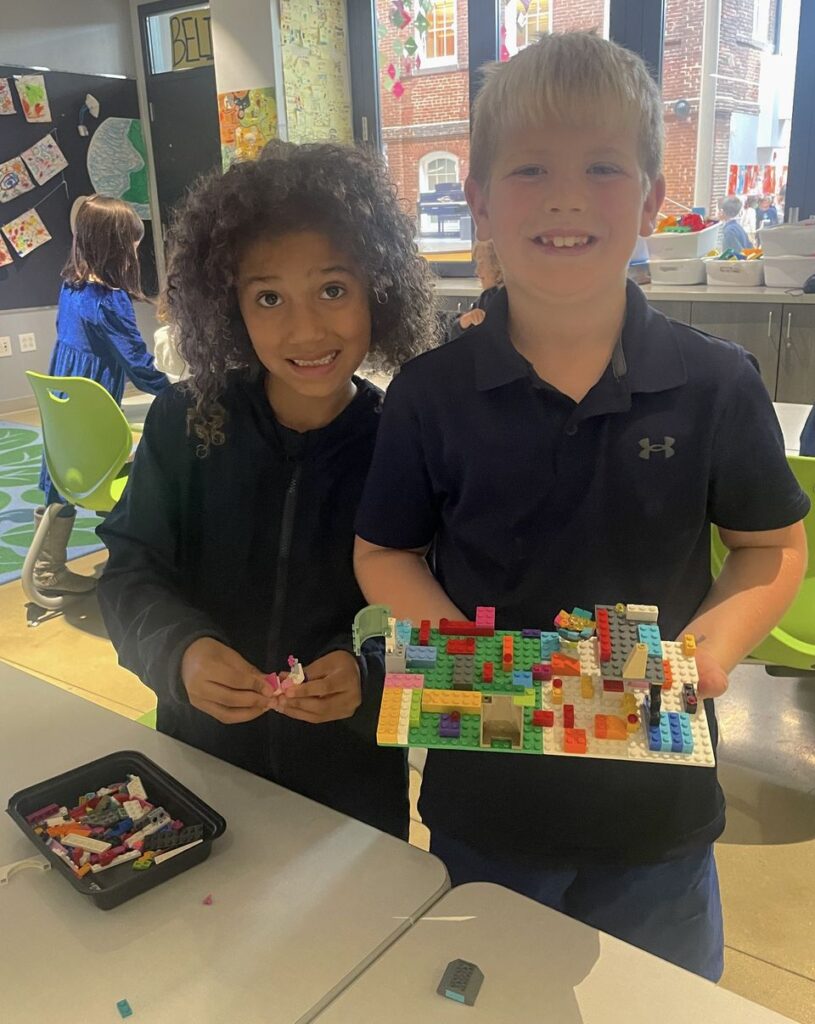
In this picture, the boys have placed solar panels and some roof plantings on a structure to the right, under which the tractor can park.
The kids have often tried to put beehives on their farms, but my kits only have simple white rectangles. These are about as realistic as the grape vines and orange trees that they imagine other blocks to be, I guess. Lego does make a "beehive," but it is a skep, and not a good looking one. (An aside, Lego has started making all sorts of floral blocks that really light up a farm!)
In class, they have already been able to explore inside a Lang hive, so I always really wished I could give them something to reflect that. So I whined to poor Matt Gagle about it! And he came through. My next scheduled "Are Bees In Trouble?" class is in early January, and I would welcome anyone interested in seeing all this in action. I am also happy to share my curriculum and slides (and my extensive Lego holdings).
Please note: the "beehives" that he contributed ARE NOT Legos, and are not for sale (Lego vigorously defends its intellectual property, and neither Matt nor I are looking for trouble). But I wanted you to know that they are possible!
For what it is worth, as the kids work together to build these farms, my partner teacher and I walk around the tables, asking kids what crop each color of block represents to them, whether they think bees pollinate it, and whether the bees are able to see the color that they have chosen very well. Sometimes we ask them if they are building a farm nearby, or some other climate (many children include bananas and mangoes, which is another way to provoke discussion!)
For kids who can only absorb so much talking at once, or who need a different set of senses or experiences to piece things together, or who learn better discussing something with a friend, this activity glues together weeks of talks very close to the end of our sessions together. I am so happy that Matt has helped me keep the bees very much present in this learning!
Remembering Dr. Wayne Esaias
- Remembering Dr. Wayne Esaias

Master beekeeper, accomplished scientists, beloved family man and friend.
Dr. Wayne Esaias, a former MSBA president, long time master beekeeper, and impetus behind the relaunch of the Howard County Beekeepers, passed away on June 6, 2024 at the age of 79 after a tough fight with pancreatic cancer. A son of the Free State his whole life, he was born in Parkville, educated at Johns Hopkins, and spent his final years in Highland.
A NASA oceanographer for almost 4 decades, Wayne used expertise in remote sensing to both study climate change and to chart nectar flow changes that resulted. He created and led the citizen science project HoneyBee Net, which had beekeepers all over North America placing hives on scales and reporting their results, years before there were digital tools to do so.
In addition to his work at NASA, Wayne was an Adjunct Professor of Entomology at the University of Maryland.
Dr. Wayne mentored dozens of us, and loved to share his expertise and enthusiasm with many other parts of the community. As an Eagle Scout and Boy Scout troop leader, he shared his love for the outdoors and mentored many young scouts. His love for gardening was a lifelong pursuit, particularly creating pollinator gardens and native wildflower meadows. Wayne also enjoyed carpentry, homebrewing, metalwork, birdwatching, and camping.
HCBA President Christina Glorioso Mullan writes, "Wayne has left us a legacy: to promote beekeeping, to educate beekeepers, and to educate the public on the benefits of pollinators. That's our mission, and it's one that I'm proud for HCBA to keep alive in his memory."
Toni Burnham remembers, "He was always willing to take a call, to spend a minute, to coach and encourage. He was a resource to me and all DC beekeepers on wintering, on troubleshooting hive scales, on keeping perspective, and keeping things both real and positive. We miss him so much!'
In lieu of flowers, the family requests donations be made to the Pollinator Partnership or the Chesapeake Bay Foundation in Wayne's memory.

[Return to November 2024 BeeLine newsletter]
Fake MSBA Emails: It's Phishing Season
- “Phishing” Season: Beware of Fake MSBA Emails

MSBA Board members will never email you with requests for assistance or money For the past few years, Board members have been receiving "phishing" emails: false messages asking for favors. Unfortunately, it appears that more and more members are receiving them, too.
Don't think twice: go ahead and delete any email that says it comes from a present or former MSBA president, treasurer, or other officer!
There is also good information online about how to recognize phishing attempts from the Federal Trade Commission.
MSBA will never, ever ask you to perform such a task or provide any type of resource in this way. Period.
Most of us have received at least a couple these messages: emails that say they are from someone who serves (or used to serve) on the MSBA Board, who wants you to contact them or obtain something for them. Apparently, small associations such as ours are an increasingly popular target for these thieves: they know we are staffed with volunteers, that people rotate in and out of positions, and that our technology is not the latest.
These emails do not originate with MSBA or any computer, server, or service we use, and we cannot block them for you. We report them as soon as we see them to the originating service or site, but we cannot guarantee immediate action.
The emails are meant to convince you to send money, gift cards, or some other source of value, purportedly to help with a problem. These thieves can be crafty, and some of the emails are convincing. One great way to check, if you are not sure, is to click on the "From" address, and see if it matches a known address for a member of our board. The real addresses are available on this website.
It is ALWAYS ok for you to forward such a message to one of us, if you want to check. Do not reply, and be sure to use an email address you have previously used to connect with that person.
If the "From" is a gmail address, we suggest that you forward it to abuse@gmail.com with the subject line "FRAUD." Quick reporting seems to get such accounts shut down relatively soon.
Once again, we are sorry for the inconvenience and confusion such messages can cause, and we are keeping our eyes open for good solutions that may emerge!
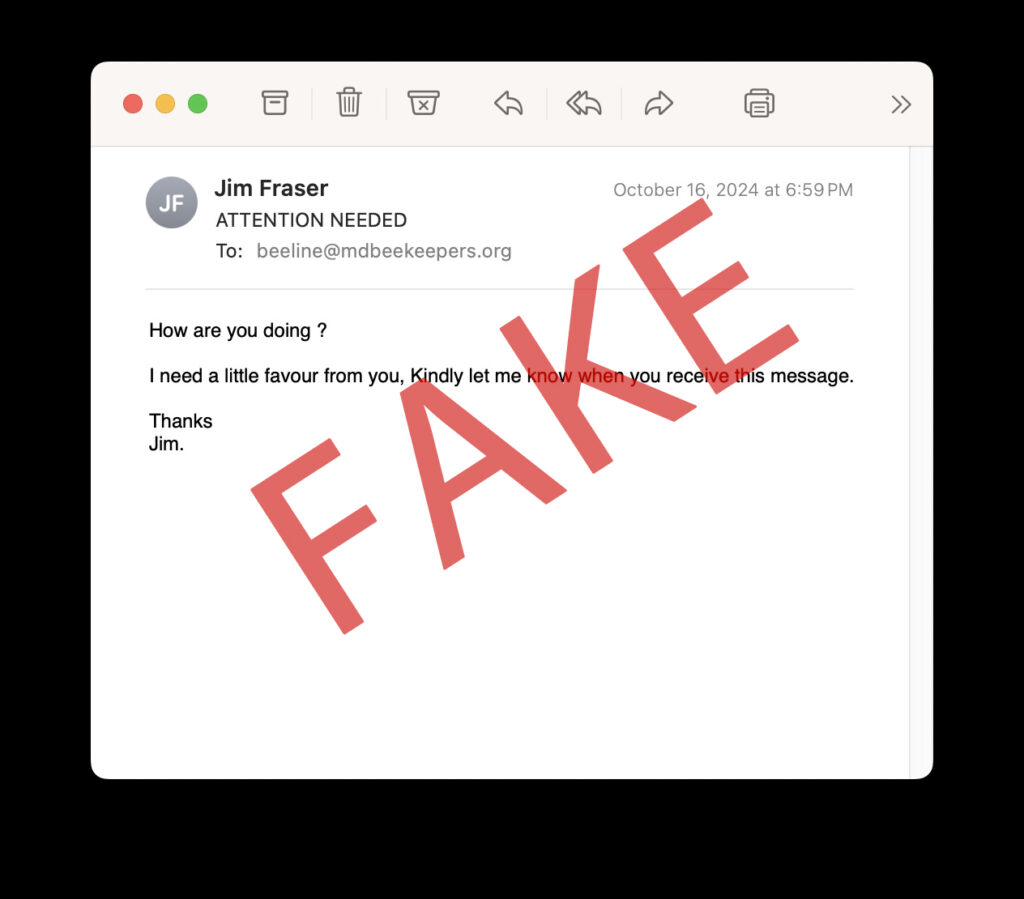
Sample of a typical FALSE email message [Return to November 2024 BeeLine newsletter]
Recipe: Pumpkin Pie with Honey
- Pumpkin Pie with Honey
LOCAL honey is best.
Click HERE to find honey nearest to you.Pumpkin Pie using local Honey
Pumpkin Pie with HoneyEquipment
- 1 9" pie pan
- 1 mixing bowl
- 1 set measuring spoons
- 1 set measuring cups
- 1 spatula
This recipe calls for LOCAL honey. CLICK here to find your nearest source!Ingredients
- 1 9" unbaked pie shell
- 2 eggs, beaten (at room temperature)
- 1 3/4 cup pumpkin puree
- 3/4 cup honey
- 1/2 tsp salt
- 1 tsp cinnamon
- 1/2 tsp ginger
- 1 2/3 cup milk or light cream
- 1/4 tsp nutmeg
Instructions
- Mix ingredients together in mixing bowl (except nutmeg)
- Pour into 9" unbaked pie shell
- sprinkle nutmeg over pie
- Bake at 350 degrees F for 1 hour (until knife/toothpick inserted in middle of pie comes out clean)
Notes
LOCAL honey is best. Find honey nearest to you:
www.mdbeekeepers.org/buy-local-honey/
EAS 2024 Turf Valley: Report and Gallery
- EAS 2024 A Huge Success! Report and Gallery
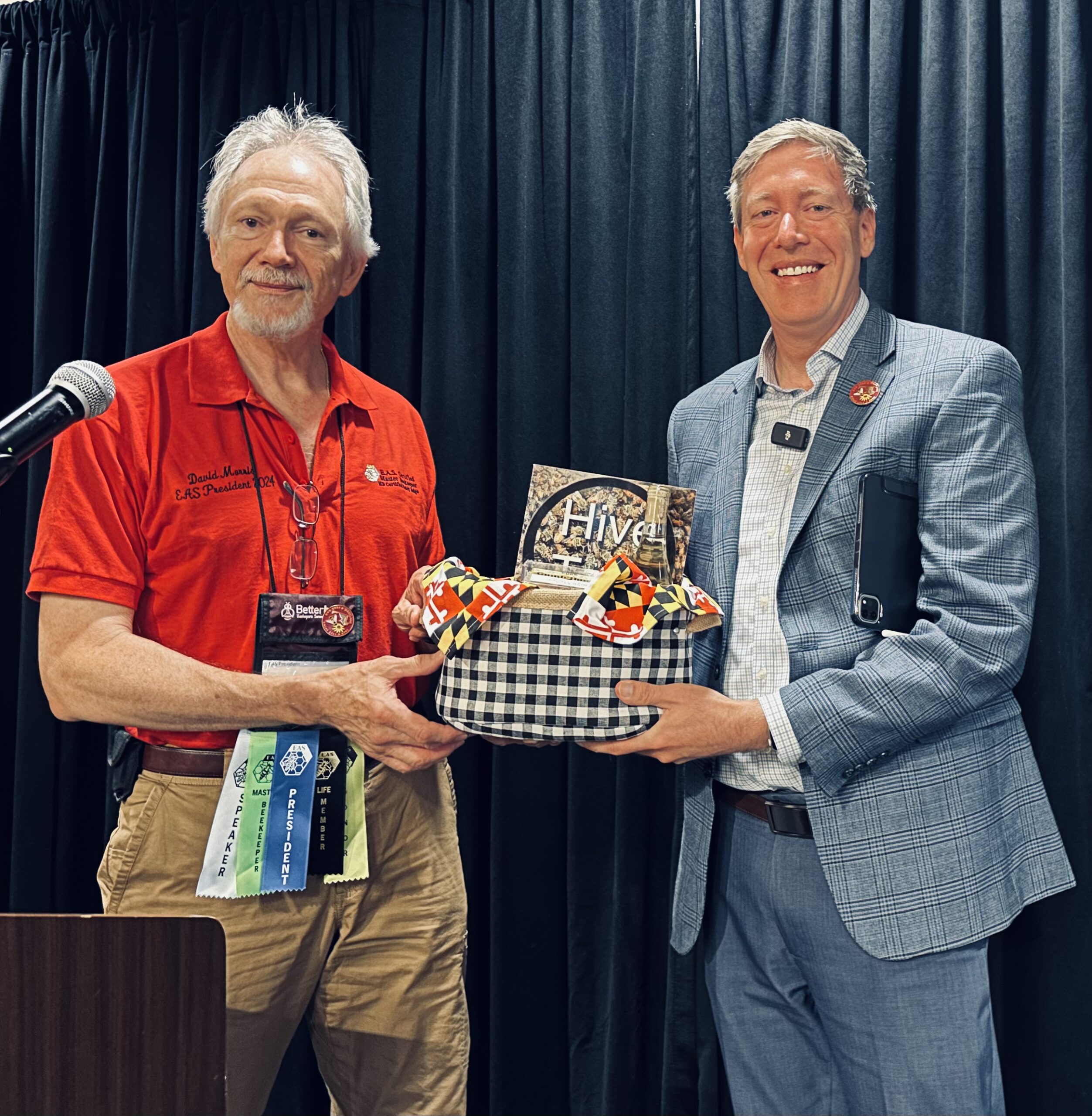
David Morris presents basket to MD Secretary of Agriculture Kevin M. Atticks MSBA would like to congratulate the awesome team of volunteers led by David Morris who made the 2024 Eastern Apicultural Society Conference at the Turf Valley Resort in Ellicott City a resounding success!
EAS attendees, speakers, and vendors maxed out the site, including more than 600 participants in the conference, which took place August 5-9. In addition to the keynote conference speakers, organizers had tracks with as many as seven simultaneous different options! Like every EAS conference, EAS 2024 included both a short course and a main program, but for the first time special "Deep Dive" half day sessions were on offer. These longer sessions gave attendees a chance to explore, in depth, topics such as Honey Bee Biology, Honey Judging, Making Nucs and Splits, and Varroa Biology. Turf Valley allowed MSBA to install a teaching apiary with a "Petting Zoo" of many hive types. There was a super fun Bee Olympics, and great conversation and education all around.
Three Marylanders Take Silver (and one Best in Show!)
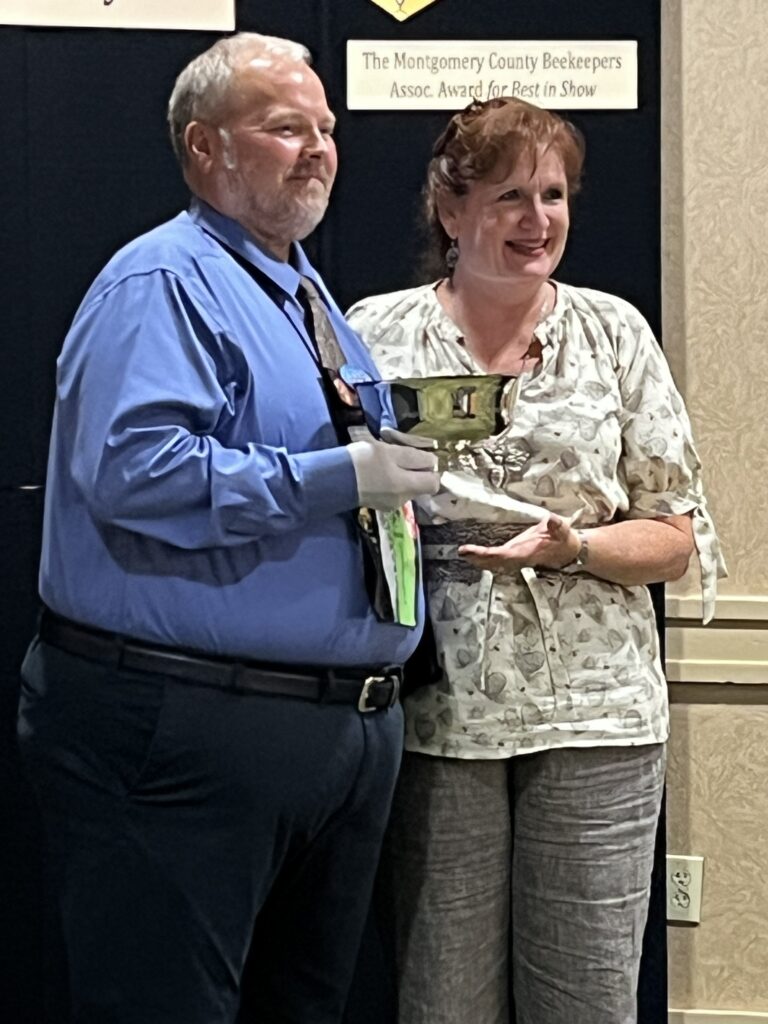
Honey Show Superintendent Jim Fraser Presents Best in Show to Elaine Storm The honey show was also wildly successful, with many entries (especially from Maryland!) and several awards of note! Silver Award Winners included Alice Parks for Honey (a hugely competitive category), Marian Iannuzzi for Honey Cookery (for her challah bread, which beat every other entry in cooking and baking), and Elaine Storm for Arts & Crafts. Elaine won Best in Show for her amazing quilt.
Among notable Blue Ribbons, Phil Frank won two, one for Photo Essay and another for close up photography. Phil will be giving a talk on how to better use your cellphone for bee photography at the November 16, 2024 MSBA Fall Meeting. (See photos in gallery, below).
Five New Master Beekeepers (and one from Maryland)
Please congratulate CiCi Sweeney, Dr. Joshua Jakum, Phil Uptmor, Scott Withers, and Anna Wysocki for becoming the newest EAS Certified Master Beekeepers. Anna is based here, in Eastern Maryland.
In consultation with MSBA VP (and Master Beekeeper Study Group ringleader) David Schultz, it appears that there are 208 current EAS Master beekeepers, 30 from Maryland. For those of you keeping score, that means 14.4% of master beekeepers are Marylanders, with even more across the country who have benefited from the local study group
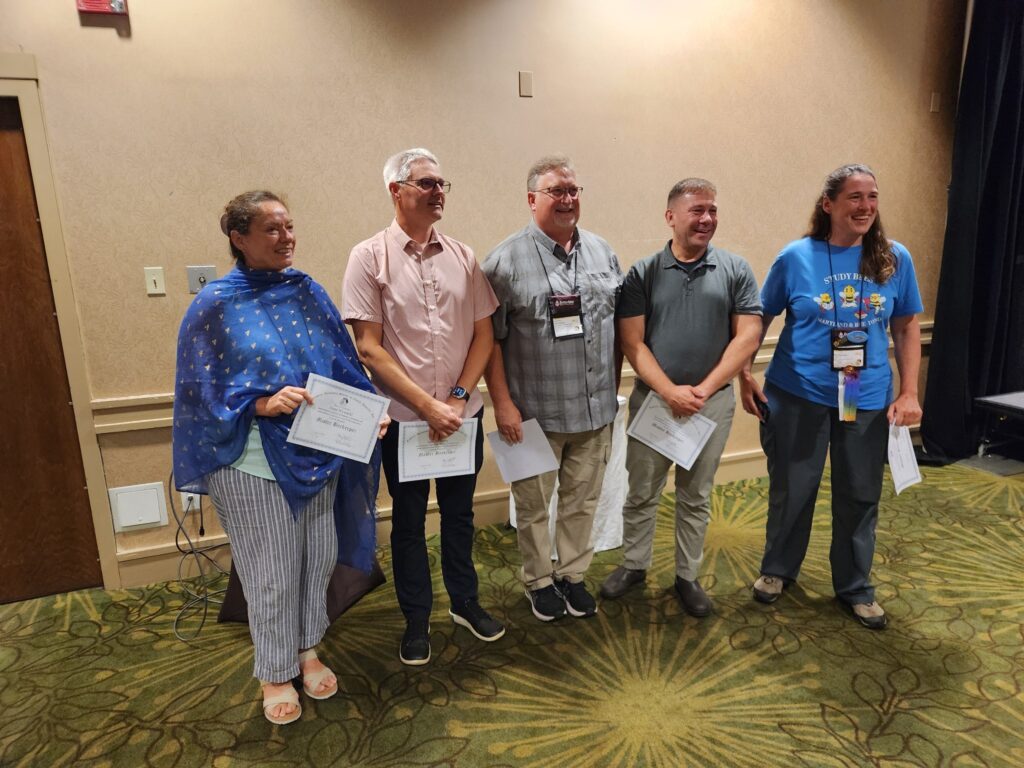
Anna Wysocki, Scott Withers, Phil Uptmor, Dr. Joshua Jakum, CiCi Sweeney The Cornell Master Beekeepers also took advantage of the 2024 Turf Valley conference to get together as well!
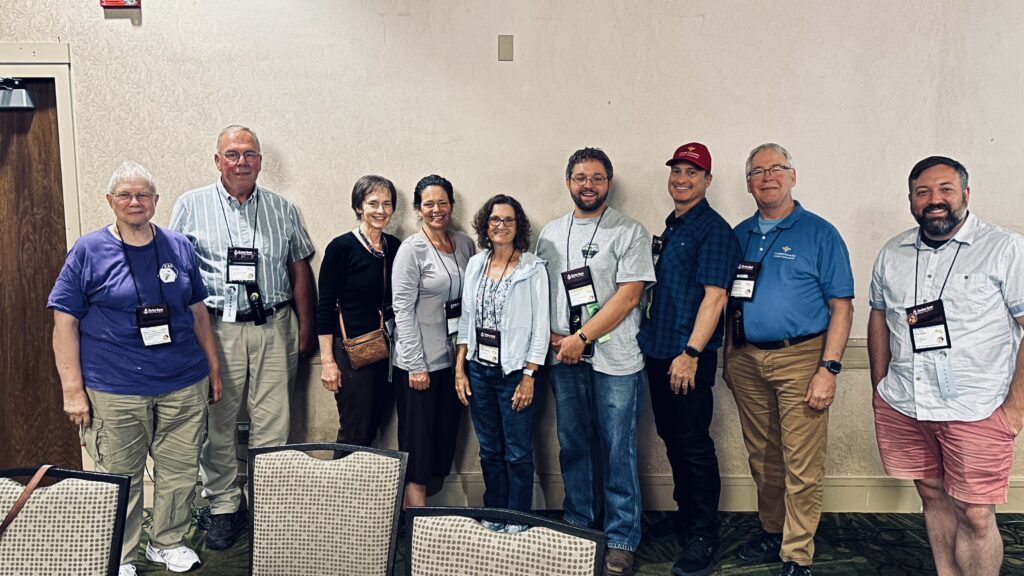
Honey Show
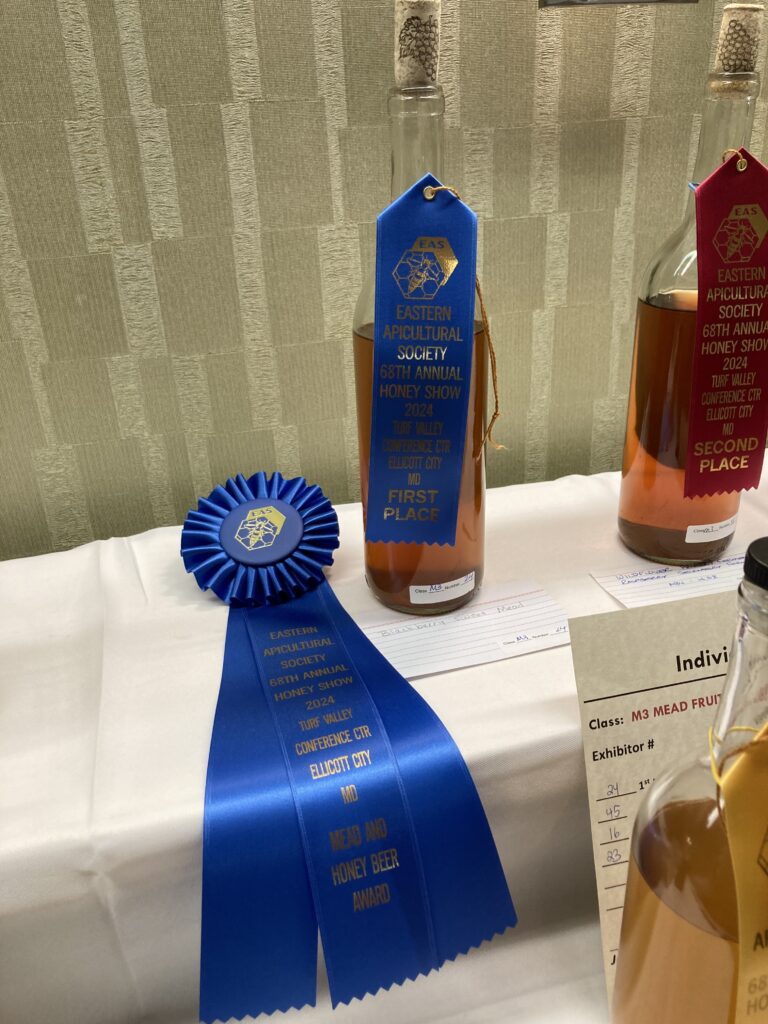
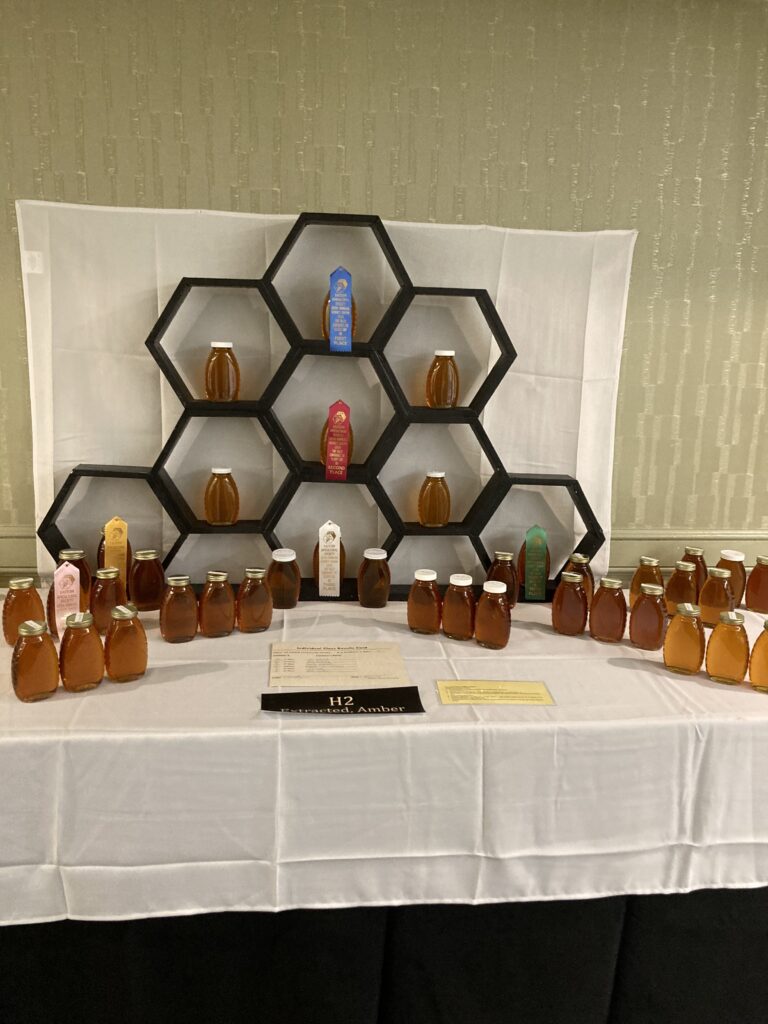
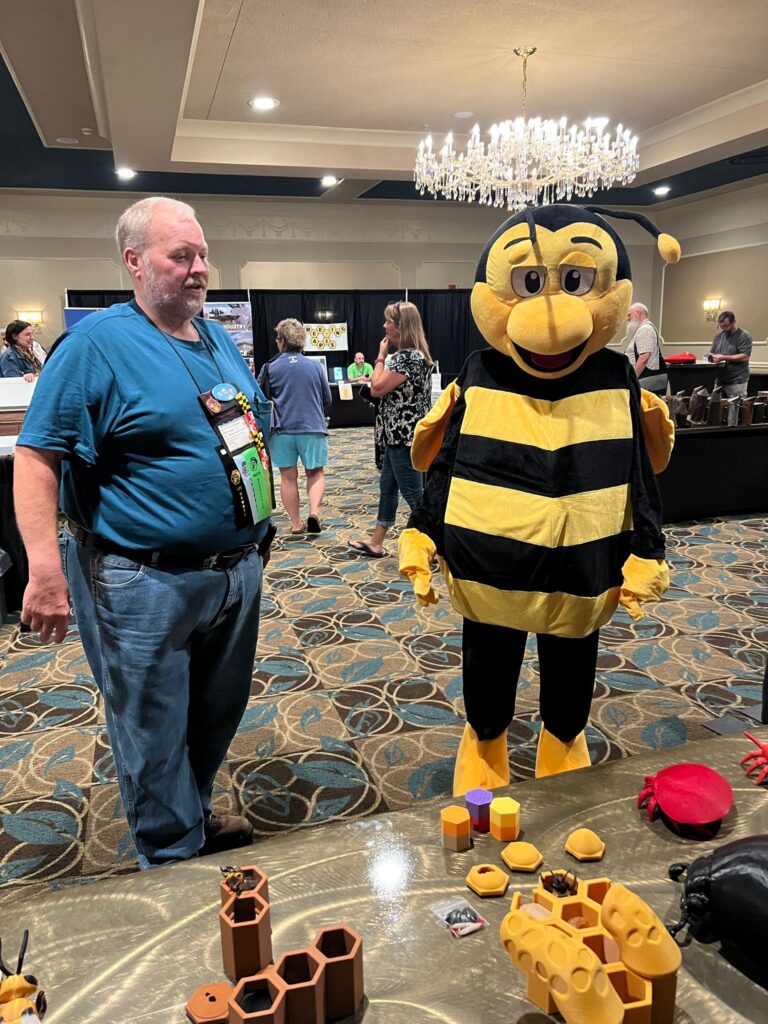
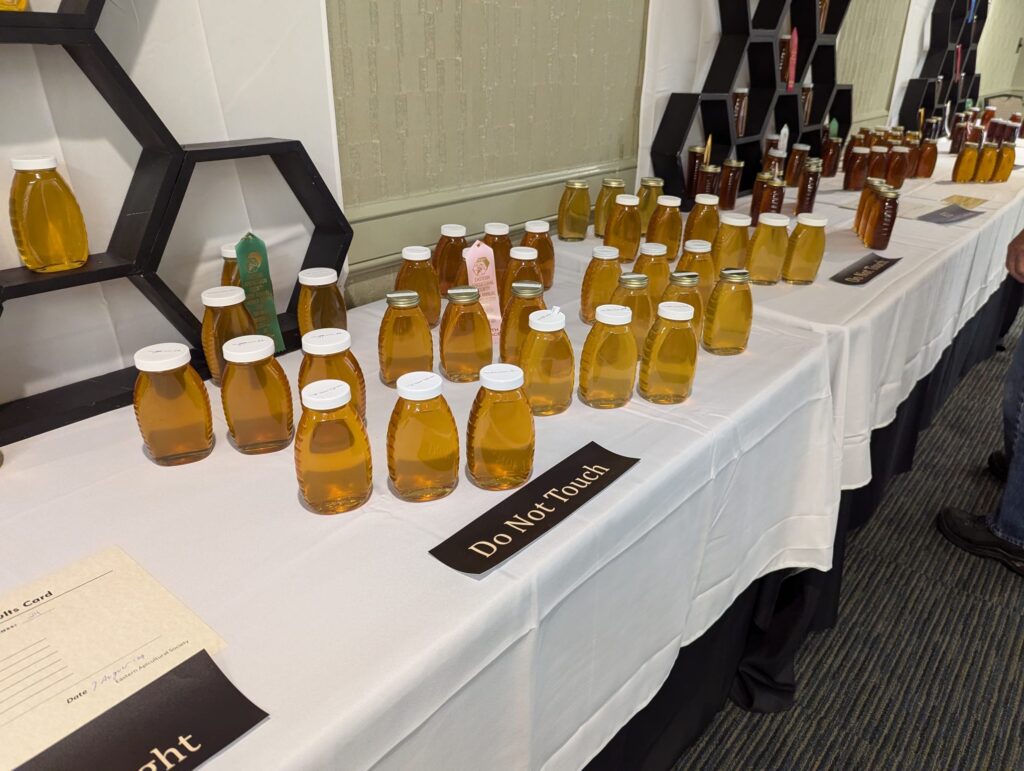
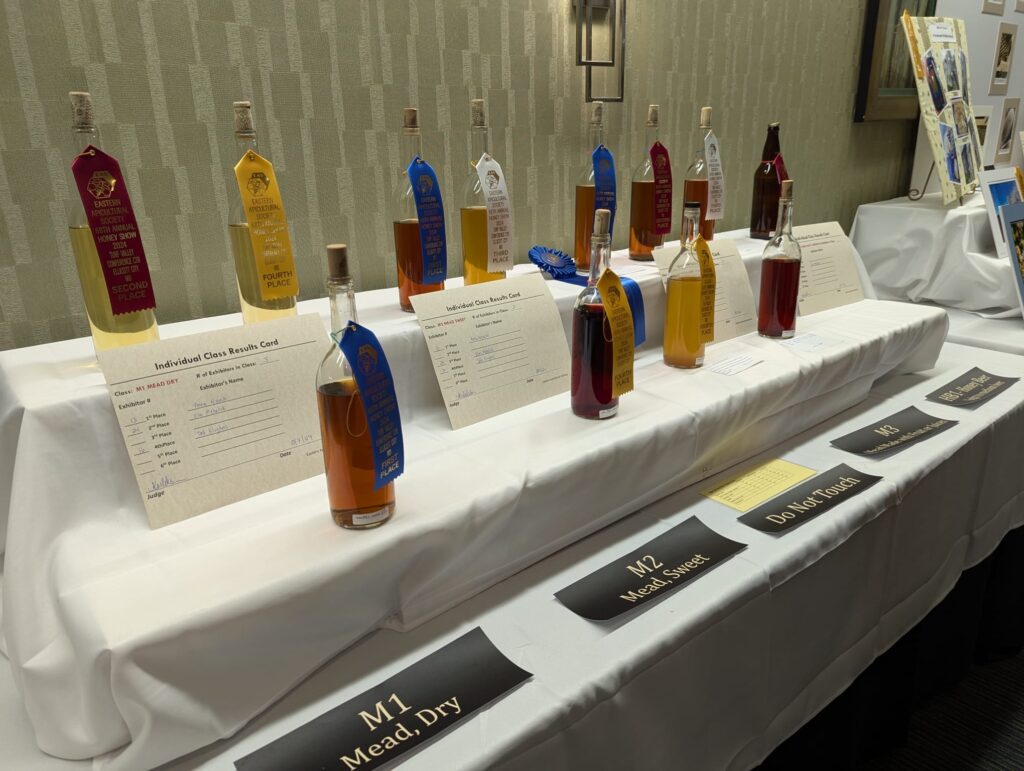
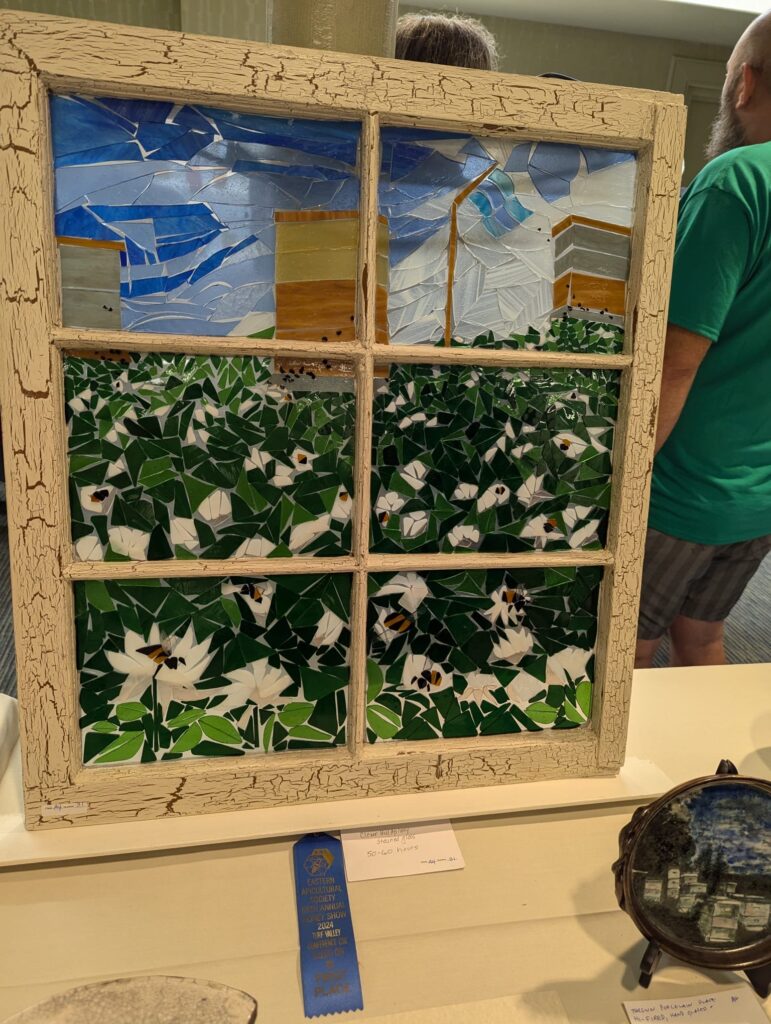
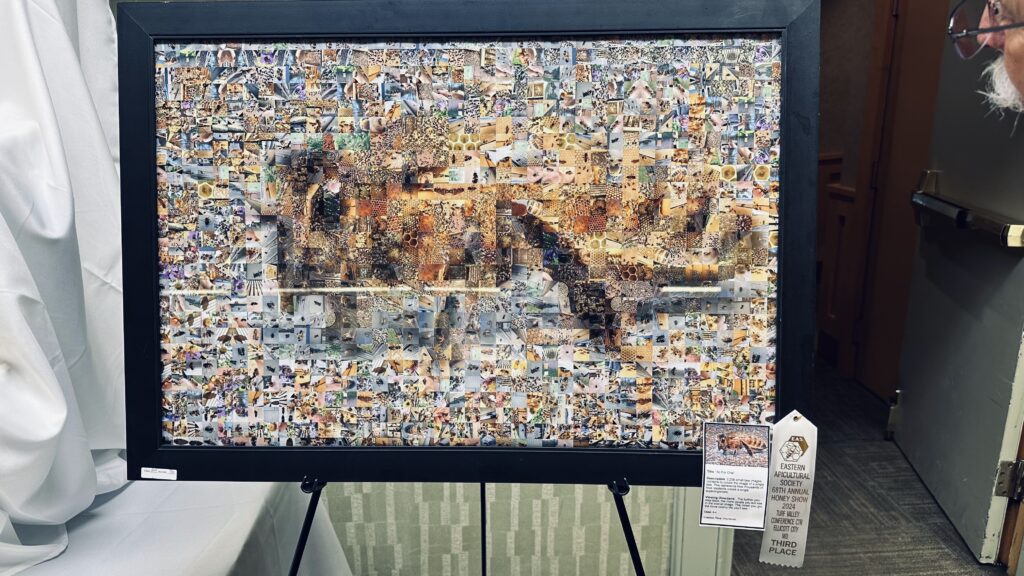
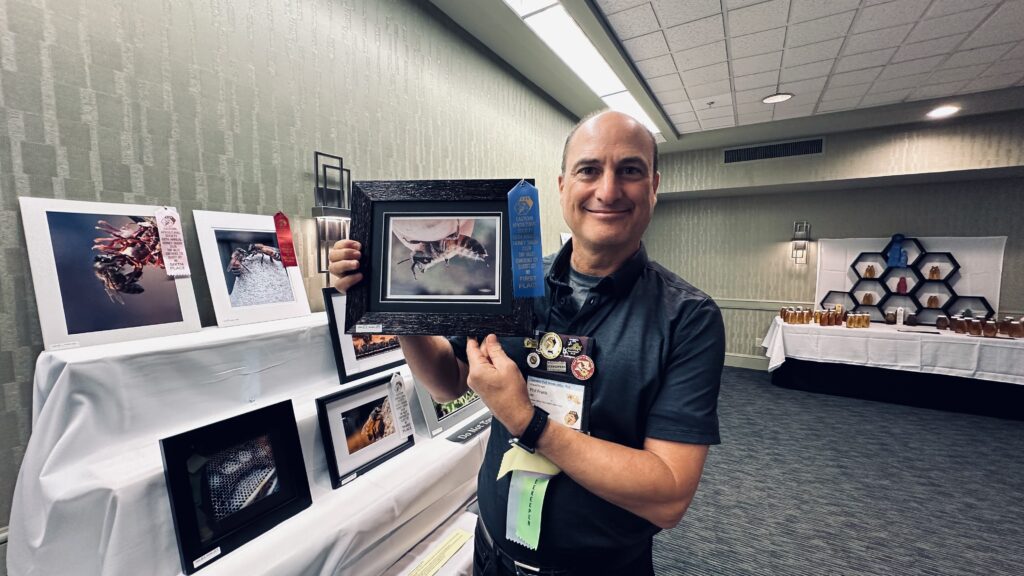
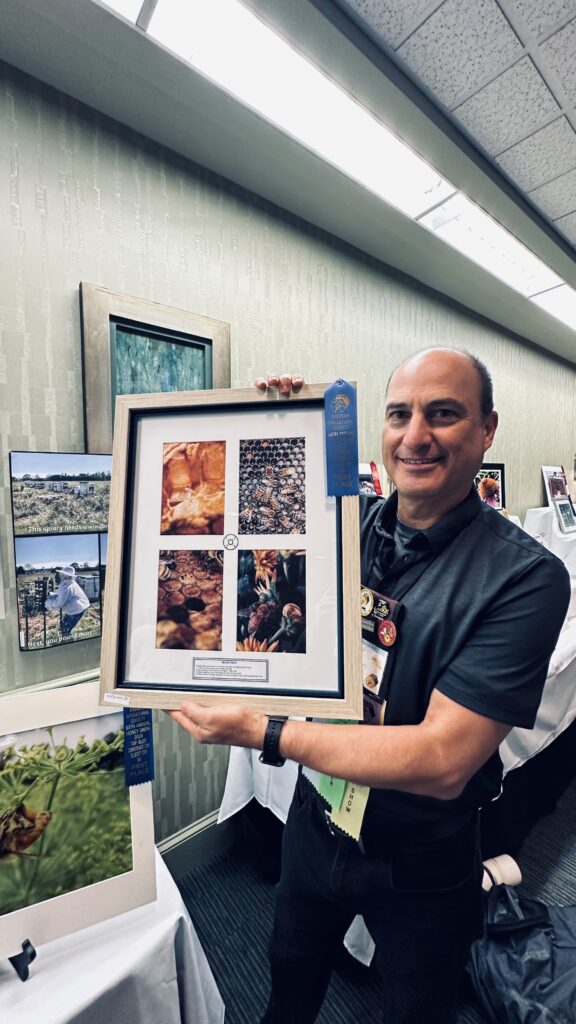
Painted Boxes
Susan Warner led the effort to paint and present hive bodies as an EAS fundraiser! In this case, several 4H groups and a summer camp put their brushes to work in a beautiful way!
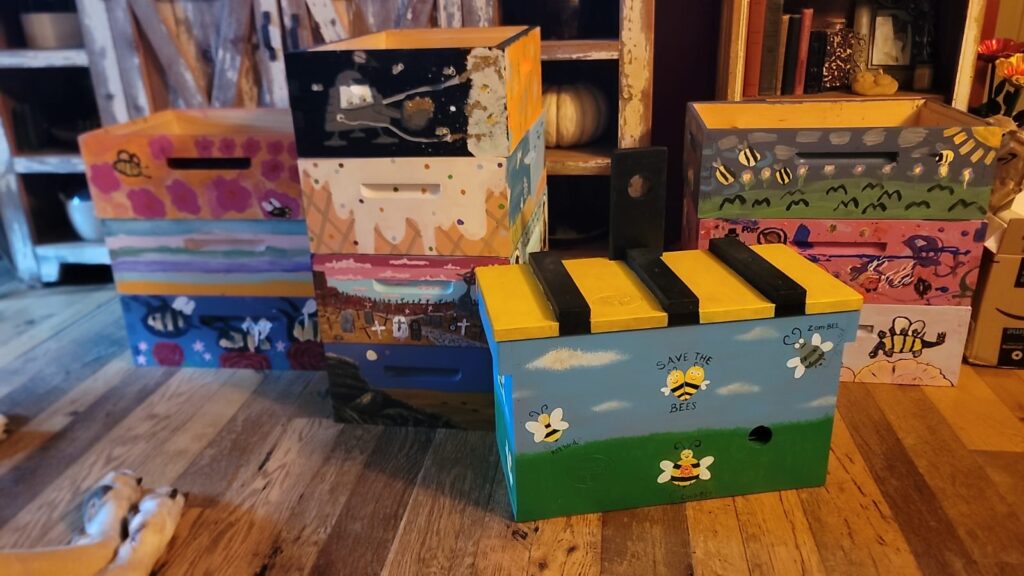
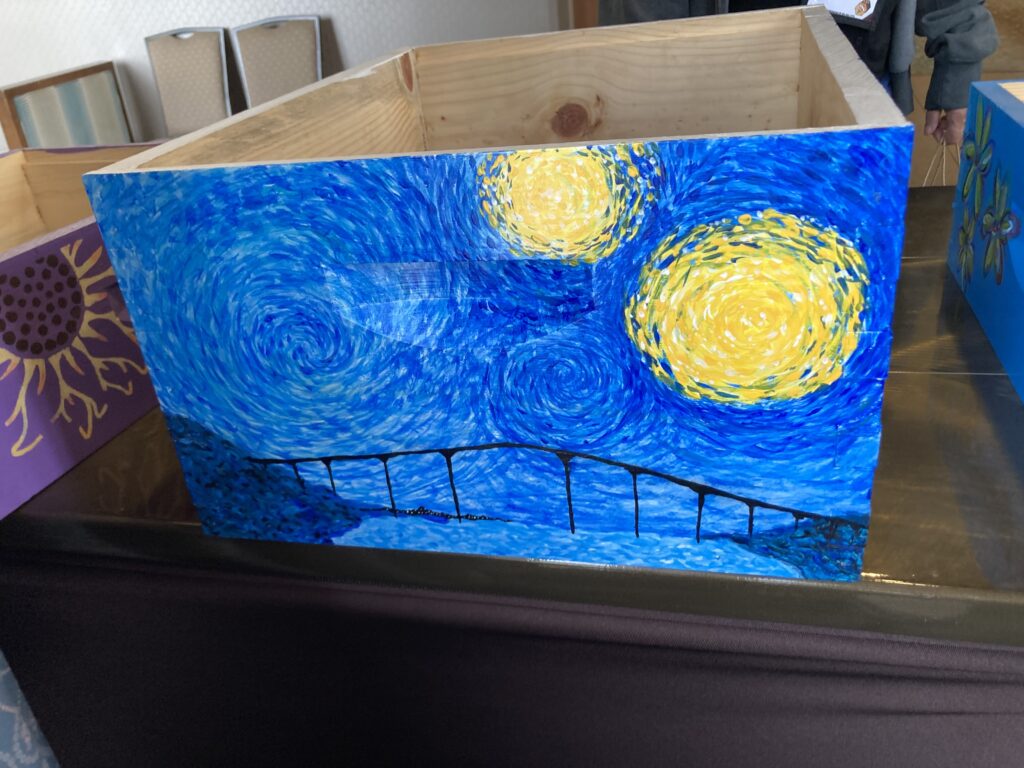
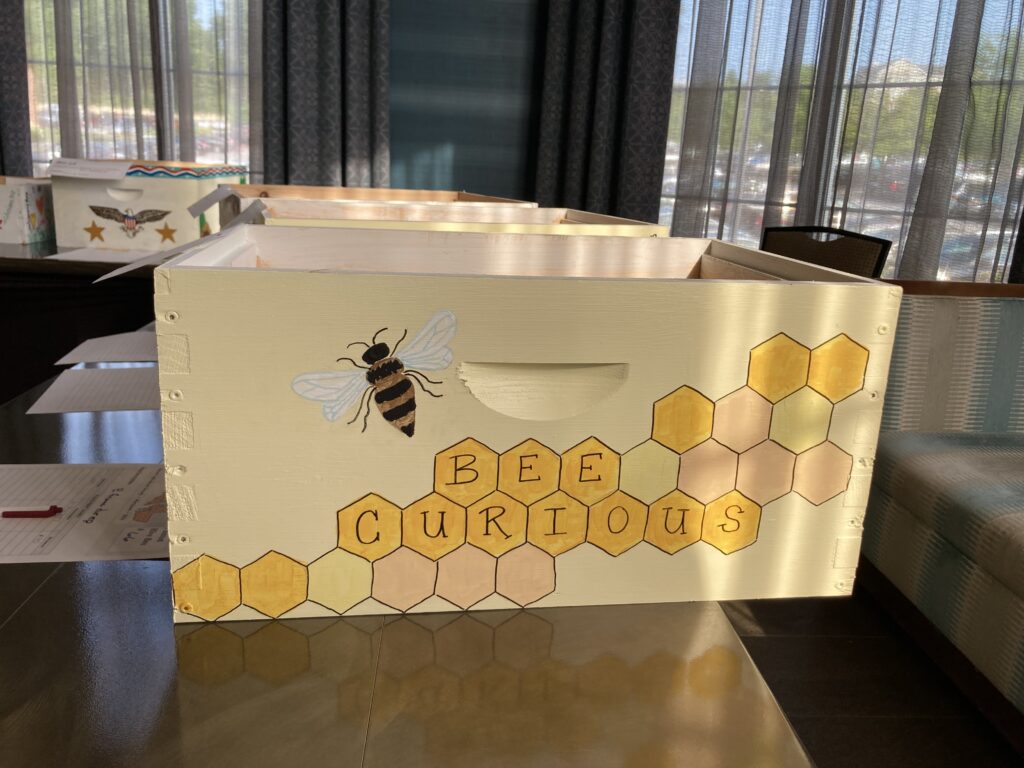
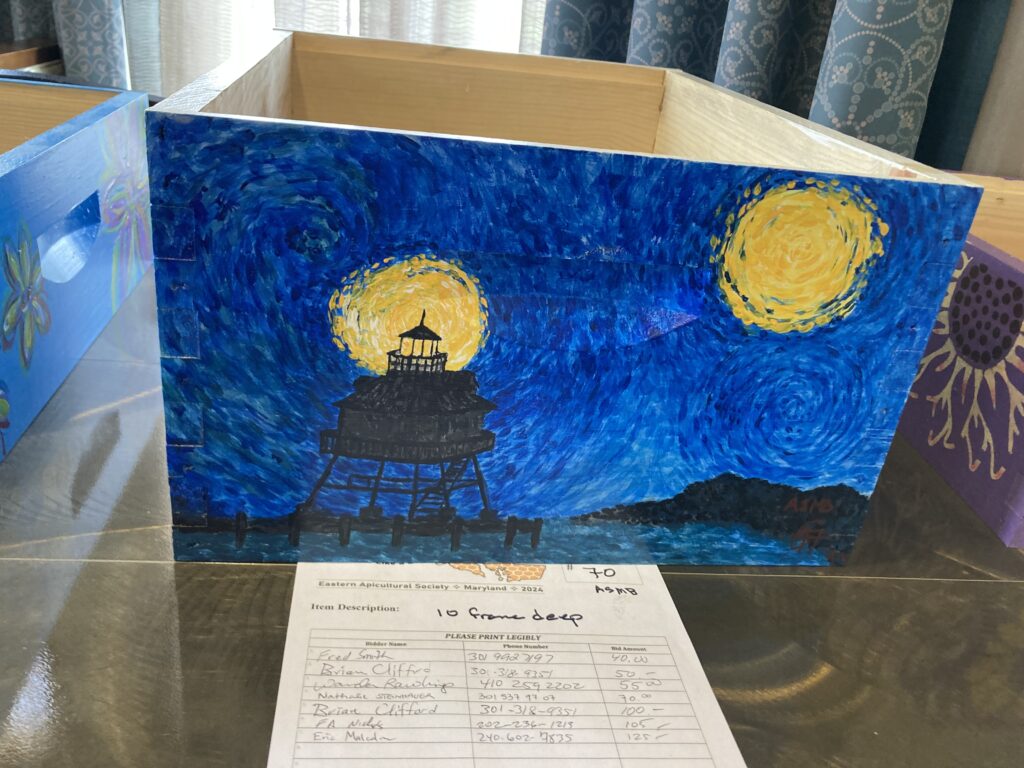
Floral Arrangements
The EAS team worked far in advance to produce and acquire Maryland wildflowers to use on the banquet tables, as well as producing cool crab shell decorations, vases in the shape of Lang hives, and more!
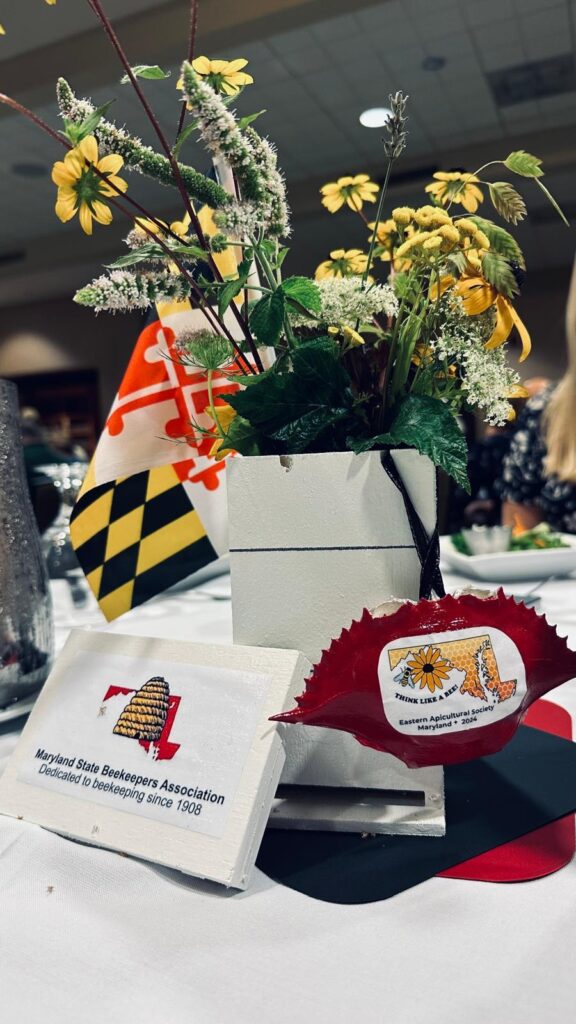

Bee Olympics Champs!
Need someone to ferry nectar, find a queen, or throw a hive tool deep into the dirt? Who you gonna call?
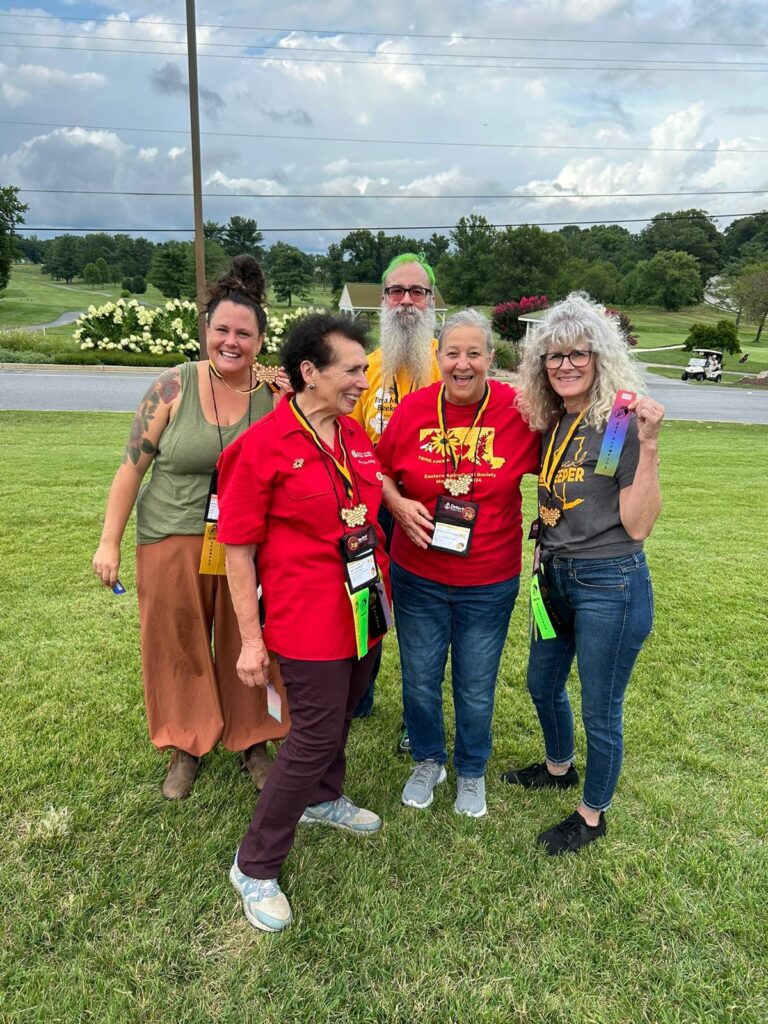
The Food was Good, too!
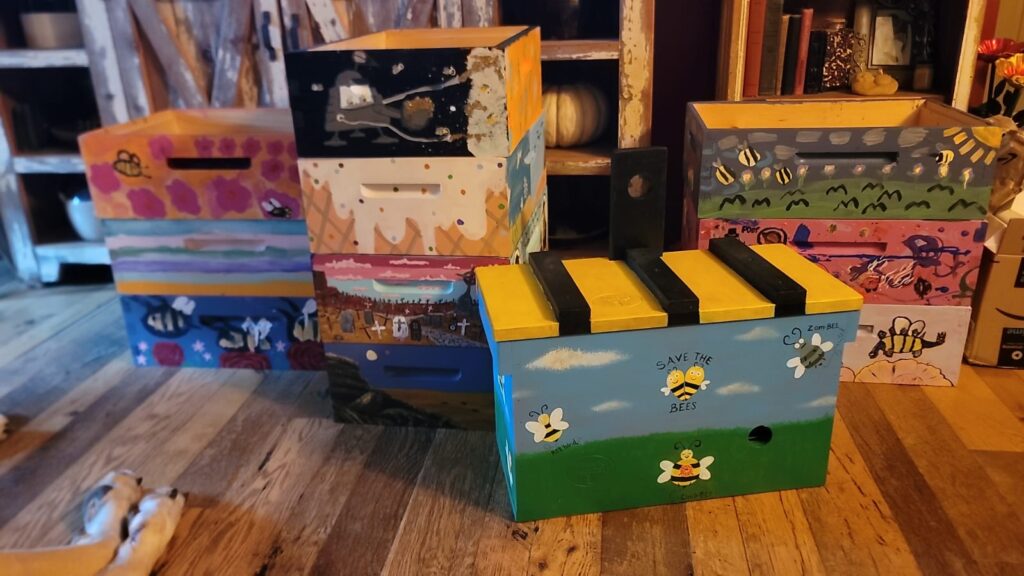
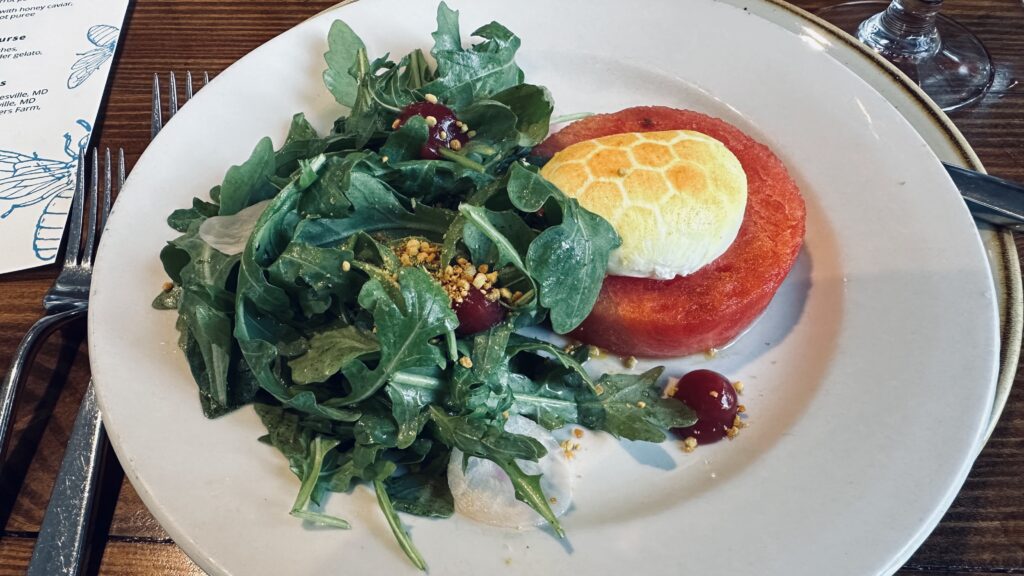
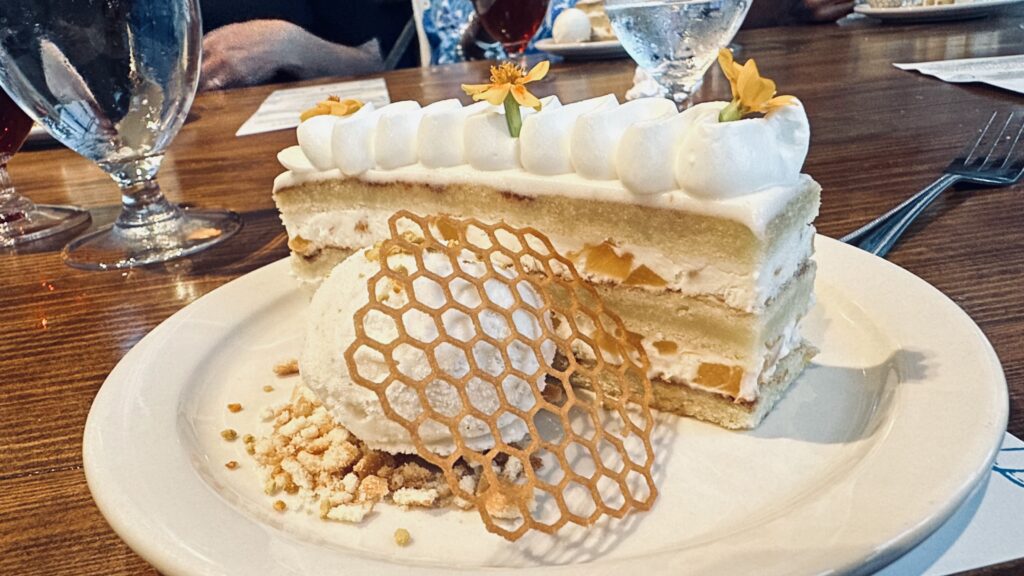
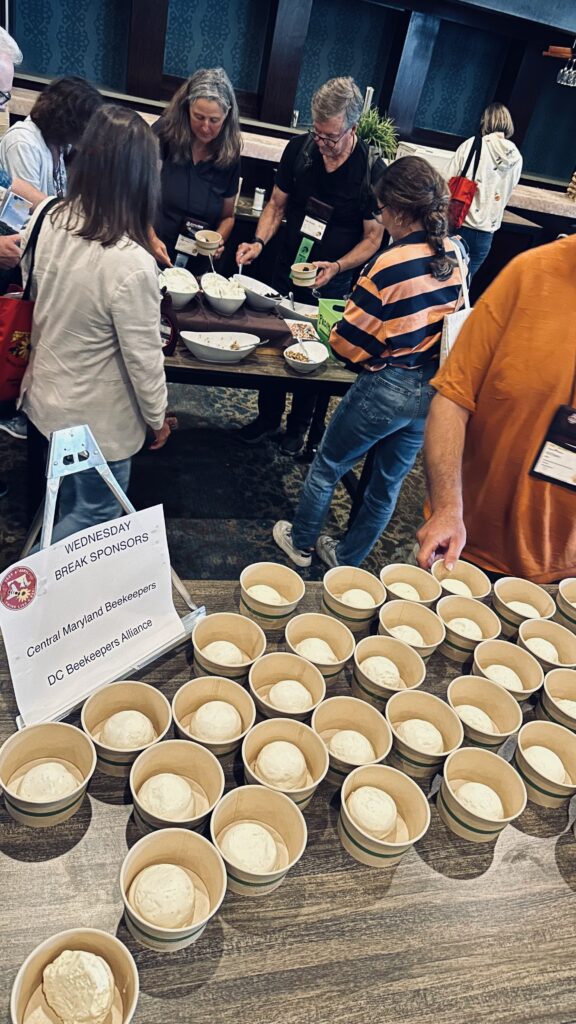
Local Associations from Maryland and DC Sponsored Refreshment Breaks The 2025 Eastern Apicultural Society Conference will take place July 27-August 1 in Cherry Hill, New Jersey! Check out EAS' site for more details as they become available!
[Return to November 2024 BeeLine newsletter]
Beekeeping News and Notes
- Beekeeping Science News and Notes: November 2024
PSU Study Using Maryland Data Finds Evidence Urban Beekeeping Negatively Impacts Native Pollinators
A Penn State team led by Dr. Gabriela M. Quinlan and using a dataset from Maryland has provided the largest scale, most phylogenetically resolved assessment of non-native honey bee density effects on wild bee abundance to date. Maryland beekeeping. The abstract explains, "As beekeeping in Maryland primarily consists of urban beekeeping, we also assessed the relative impact of developed land on wild bee communities." Take homes? There is a 90% probability that managed beekeeping is detrimental to 6 of 33 wild bee genera, with biggest impacts on primarily late-season, specialist genera (several long-horned genera represented) or small, ground nesting, season-long foragers (including several sweat bee genera). One upside: " developed land was associated with an increase in relative abundance for some genera including invasive Anthidium and other urban garden-associated genera." [More info]

Bee Bread Sampling May Be Useful Monitor of Colony Chemical Exposure
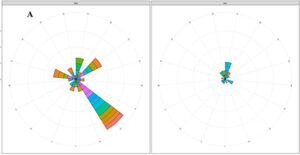
May vs. June Residues in Bee Bread
What if analysis of bee bread could unlock information about types of chemical exposure, its timing, and its sources for our colonies? A Slovakian research team led by Martin Staroň and Abdulrahim T. Alkassab published findings in the October 2024 Apidologie that demonstrate that analysis of in-hive stored pollen reflects the spectrum of visited plants. Bee bread can be considered a suitable matrix and a good bio-indicator reflecting honey bee exposure to pesticides over the season. In May, they found much higher chemical residue levels (including both pesticides and fungicides, and legal and illegal substances) than they did in July. They were able to associate particular contaminants with specific species on which the bees had foraged. [More info]
Honey bees stockpile in comb structures symmetrically
We may be messing things up more than we know when we dig around in our colonies! The Smith Bee Lab at Auburn University has just published a study demonstrating consistent symmetry in the organization of the internal contents of honey bee colonies. The colony creates a mirror image, where the contents on one side of the honeycomb match the opposite side. What’s more, this symmetry benefits the colony, and is found across all species of honey bees they investigated. “We kept colonies in huge observation hives, so that the bees could build a full-sized nest between the two panes of glass, and we could inspect the nests many times without disturbing them. The only problem is that when you want to map the nest, all the bees are also in there, so you have to wait until they move out of the way to peek inside each cell...we were able to collect 148 nest maps from six colonies” said Michael L. Smith, PI of the Smith Bee Lab, and first-author of the study published in Current Biology. [More info]
Bee Cooperation: It's Nature, Not Nurture, and the Genes Prove it
Eusocial, cooperative behavior in honey bees is widely observed and admired, but our understanding of its origin and mechanisms is still rudimentary. A Heinrich Heine University team led by Dr. Martin Beye has recently demonstrated that honey bee cooperation is strongly linked to a single gene: doublesex (dsx). It's an important question: many studies have demonstrated bees' ability to learn, and improvement in performing tasks like Waggle Dancing over time. But cooperation is innate. The key discovery is that the dsx gene influences worker bee-specific behavior, noted study first author Dr. Vivien Sommer. “The gene programs whether a worker bee takes up a task in the colony and for how long. This includes collective tasks such as caring for the larvae or foraging for food and social exchanges on food sources, for example." [More info]
Honey Bees Effective in Saving Elephants
Though human-elephant conflict is growing in Kenya, a recently completed 9-year University of Oxford study published in the Journal Conservation Science and Practice, shows that beehive fences deterred 86.3% of elephant incursions into farm fields. Kenya is experiencing explosive population growth, and elephant damage to crops is driving threats to the mammals. First introduced by Save the Elephants in 2007, fences comprised of beehives have shown promise. This study is the first to demonstrate how effective this strategy can be! However, researchers caution that ongoing habitat degradation and persistent droughts could threaten the long-term effectiveness of this natural deterrent. [More info]
New Honey Bee Certification Program for Veterinarians
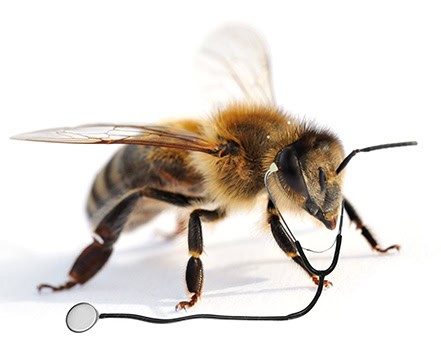
The Veterinary Food Directive of 2017 made the path to treatment of colonies with antibiotics pass through a veterinarian, even though vets who are Apis-savvy are hard to find. This fall, however, the Honey Bee Veterinary Consortium, which has been working on the issue for several years, announced a new certification program in honey bee medicine for veterinarians – the CertHbV designation. It is a significant commitment! Veterinarians are asked to complete 150 continuing ed hours over 7 topical modules, including requirements for 40 hours of hands on experience, 30 of it with at least three different beekeepers. The site also includes a searchable list of veterinarians who are interested in working with bees. [More info]
AFB/EFB Test Kits Will No Longer Be Available in the USA

Due to their low cost, ease of use, high sensitivity and specificity, and immediate results, beekeepers, and state apiary inspectors and even veterinarians have relied on Vita Bee Health American Foulbrood (AFB) and European Foulbrood (EFB) diagnostic kits to diagnose AFB and EFB in honey bee colonies. The diagnostic kits are currently available in 60 countries, no longer including the US. The kits are still in stock at several retailers, but have expiration dates/cannot be stockpiled. The USDA's Center for Veterinary Biologics informs that Vita Bee Health had a provisional permit to sell the diagnostic kits in the US and unfortunately, before that permit expired, they did not follow up with the approval process. According to Vita Bee Health, the two-year registration process was
prohibitively expensive. Alternatives? Submit a sample to the Beltsville Bee Lab (though this takes time) and brush up on colony diagnostics. [More info][Return to November 2024 BeeLine newsletter]
Fall Meeting 2024 Information
- 2024 November 16 MEETING
Join the Maryland State Beekeepers Association for a fascinating day packed with insights on honey bees & useful tips to keep them.
- Elections!
- Expert Speakers!
- HONEY SHOW!
- AWARDS! Free State and George Imirie
You are not logged in. Please login TO VIEW THE RECORDING. Thanks!
EVENT: MSBA will convene its 116 ANNUAL FALL MEETING, and 87th Honey Show with Guest Experts
DAY: November 16, 2024
TIME: 8:30AM - 4-ishPM
LOCATION: Zoom AND Montgomery College Germantown Campus
ADDRESS: If attending in person: 20200 Observation Drive, Germantown, MD 20876
The main meeting room will be Globe Hall in the High Technology (HT) Building.
Adjacent spaces on the first and second floor are reserved for honey show, vendors, and catering/food.
The meeting spaces are on the ground level and second floor with conveniently located elevators and restrooms on both floors.
Here is a link for a PDF map of the MC Germantown Campus: Germantown_Campus&Vicinity.pdf (montgomerycollege.edu)TIME EVENT SPEAKER 8:00-9:00 AM Submit Honey Show Entries 8:30 AM Refreshments, Coffee, Donuts, etc. 9:00 AM Opening and Welcome Mary Laura Fitzgerald, President 9:00 AM Apiary Inspector's Report Cybil Preston,
Md. State Inspector9:20 AM The Biology of Mating
(IN PERSON)Gard W. Otis, Professor Emeritus, University of Guelph 10:10 AM Break 10:25 AM Take Better Bee Photos With Your Cell Phone
(IN PERSON)Phil Frank, EAS & Cornell Master Beekeeper, Co-Author of the Photo Book “Hive Tour” 11:15 PM 2024 EAS Conference Recognition David Morris, EAS Master Beekeeper 11:25 AM American Beekeeping Foundation Representative Lisa Ghezzi, EAS Master Beekeeper 11:30 AM Annual MSBA Business Meeting:
Imirie and Free State Awards;
Treasurer's Report;
Elections for 2025 Board
(IN PERSON)Toni Burnham, Secretary; Lisa Ghezzi, EAS Master Beekeeper and MSBA Treasurer 12:00 Noon Lunch 1:10 PM Comb and Nest Architecture (IN PERSON) Grai St. Clair Rice, Writer, Artist, Organic Beekeeper 2:00 PM The intricate Process of Honey Bee Swarming
(IN PERSON)Gard W. Otis, Professor Emeritus, University of Guelph 2:50 PM Honey Show Results;
BreakJim Fraser, EAS Certified Master Beekeeper, Past President/MSBA 3:05PM Honey bees in the Garden: A Dance with Evolution (IN PERSON) Grai St. Clair Rice, Writer, Artist, Organic Beekeeper 3:55 PM Closing remarks Mary Laura Fitzgerald, President 4:00 PM Adjourn
HONEY SHOW
PRESENTATIONS:
"The intricate Process of Honey Bee Swarming" - Gard W. Otis, Professor Emeritus, University of Guelph
"The Biology of Mating" - Gard W. Otis, Professor Emeritus, University of Guelph
"Take Better Bee PHOTOS With Your Smartphone" - Phil Frank, EAS & Cornell Master Beekeeper, Co-Author of the Photo Book "Hive Tour: The Insider's Guide to Honey Bees"
Get loads of tips and techniques to take honey bee pictures better, closer, and faster. (Just in time for your holiday photos!)
You'll learn:
* how to give your phone-camera new capabilities
* how to overcome the most common phone photography mistakes
* 7 ways to avoid blurry photos
* Which lens to use
* how to focus tricky shots
* and much more.
"Comb and Nest Architecture" - Grai St. Clair Rice, Writer, Artist, Organic Beekeeper
A look at how honeybees construct comb using their unique physiology. It is both an act of community building and a feat of precise, structural integrity.Knowing how honeybees transform crystalline beeswax into the dynamic skeletal structure ofthis superorganism has the capacity to transform simple beekeeping habits into complex appreciation.
"Honey bees in the Garden: A Dance with Evolution" - Grai St. Clair Rice, Writer, Artist, Organic Beekeeper
During the course of evolution, pollinators and plants have been involved in a seductive
relationship that has been instrumental in creating the fecund world we live in today.
Understand how honeybees forage and how they interact with flowers in their search for nectar
and pollen.BIOGRAPHIES:
Dr. Gard Otis studies the ecology, behaviour and evolution of honey bees and other insects. During his career, he has studied the swarming biology and population growth of Africanized honey bees in South America; drone behavior; the impact of tracheal mites on bee colonies; breeding bees resistant to tracheal mites; and defensive strategies of Asian honey bees to hornet attacks. From 2006-2013 he directed a highly successful beekeeping development project in Vietnam, for which he received the Order of Vietnam. He is recognized as an authority on the diversity of honey bees in Asia and is the only person in the world to have observed all of the species of honey bees in their native habitats.
During his career at the University of Guelph Gard taught more than 7000 students about the fascinating lives of honey bees and other insects.
Now retired, he remains involved in research and writing projects related to honey bees, hornets, and butterflies. He currently collaborates with researchers in India on the ecology and behavior of giant honey bees and in Vietnam on honey bee responses to attacking hornets. Gard lives with his wife and son near Guelph, Ontario.
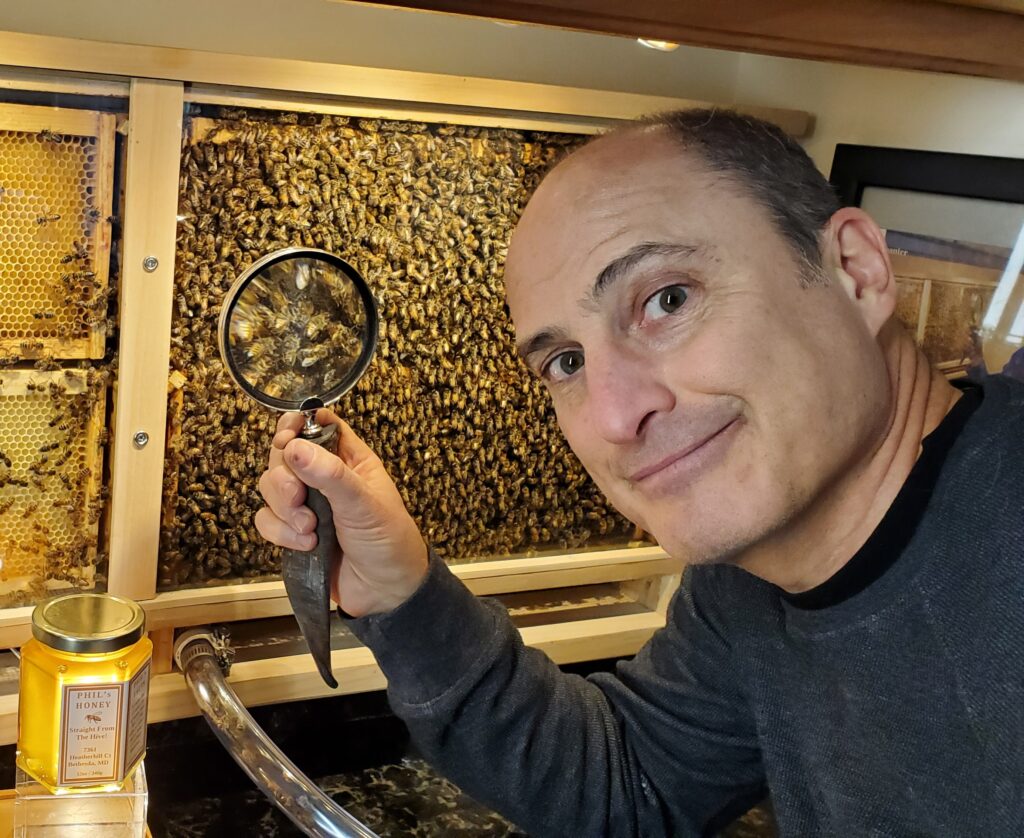
Phil Frank is a science journalist and TV producer, writer, and director of non-fiction films. His programs have been seen on CNN, Discovery Channel, National Geographic Channel, Science Channel, A&E, Travel Channel, Headline News, History Channel, TLC, NYTimes website, Washington Post website, and international channels.
Phil is webmaster for MSBA and MCBA. He is a Certified Master Beekeeper certified by EAS and Cornell University. Phil recently co-authored and published 'Hive Tour' a photo rich book showing the extraordinary lives of honey bees.Grai St. Clair Rice is an organic beekeeper, with 19 years of experience, as well as a writer/artist based in NYC.
In 2022, Grai started a solo company BeeJoy.org, to continue teaching and coaching beekeepers, and consult on landscape plantings for pollinators. She engages the public with visual presentations on beekeeping and gardening for honey bees, and helps broaden the vital knowledge and appreciation of honey bees and other pollinators. Grai co-founded HoneybeeLives in 2005, as an organization dedicated to encouraging a strong honey bee population by teaching in-depth workshops with an Organic, Biodynamic approach. Grai is the founder of the contemporary Ulster County Beekeepers Association. Grai became a badge carrying Citizen Pruner in NYC in 2013.grai@beejoy.org
https://www.facebook.com/BeeJoy
Instagram: beejoy.ny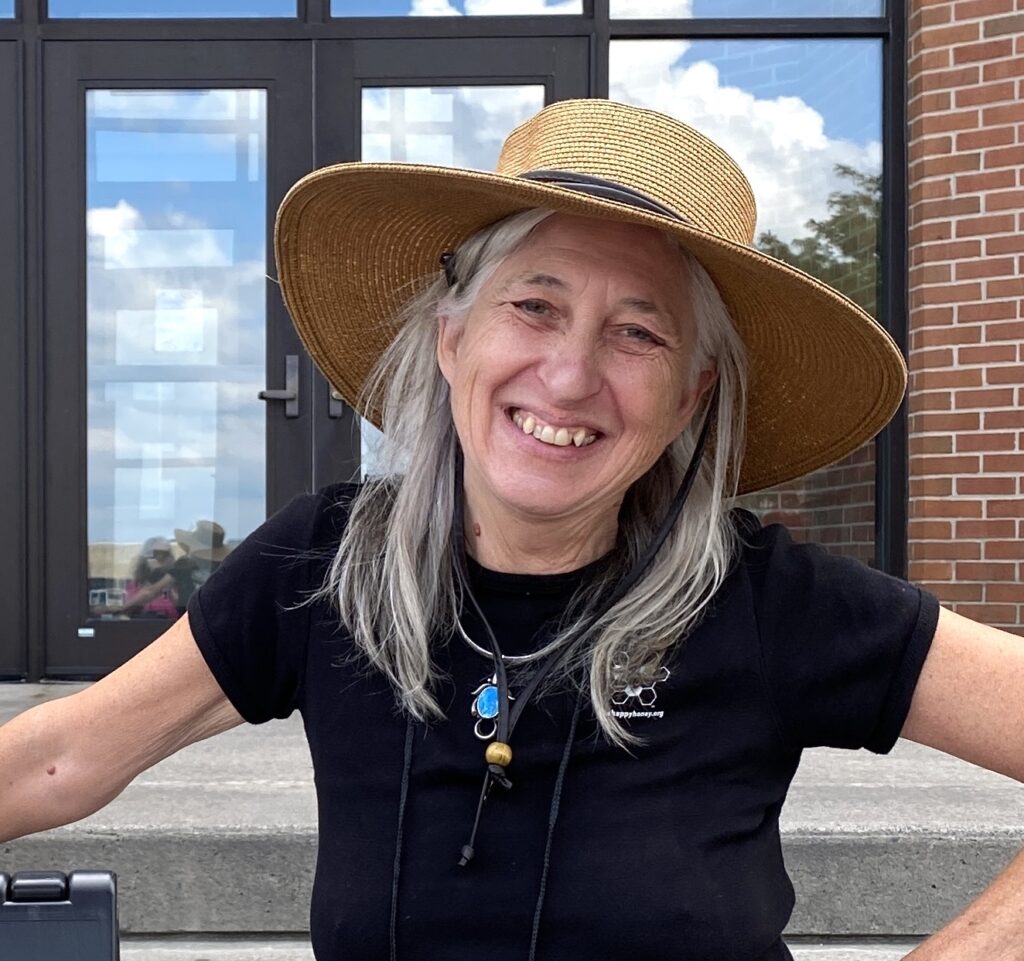
ZOOM INFO
https://us06web.zoom.us/j/84716778023?pwd=a0SW47nCrFPEXLg7ihMfUcLlN4w9h0.1Meeting ID: 847 1677 8023
Passcode: 521472
One tap mobile
+13017158592,,84716778023#,,,,521472# US (Washington DC) +13126266799,,84716778023#,,,,521472# US (Chicago)
Dial by your location
- +1 301 715 8592 US (Washington DC)

